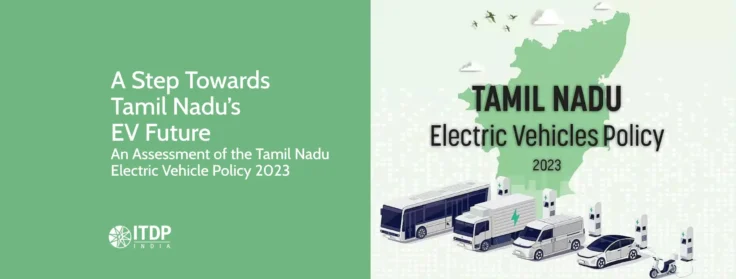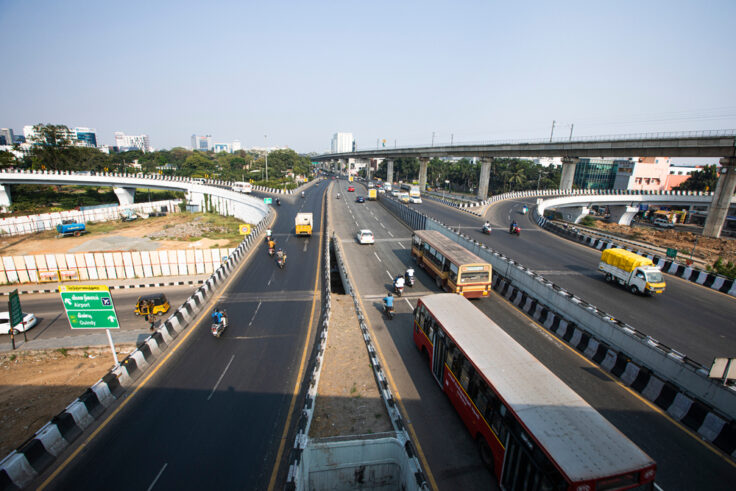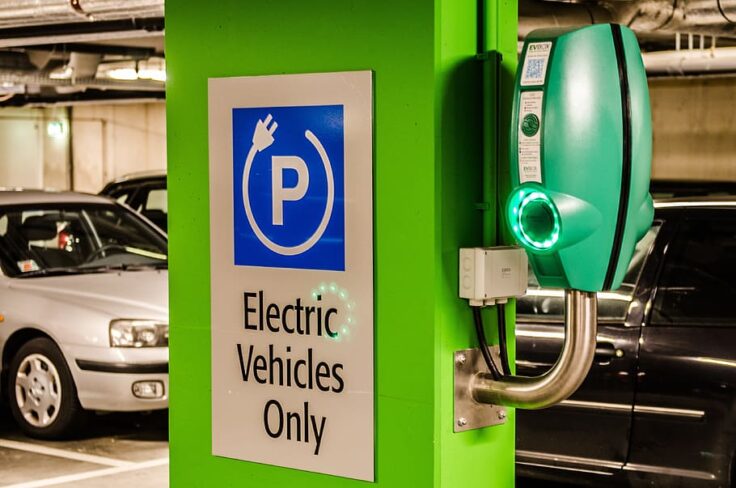August 09, 2023
How this State in India is Envisioning a Future for Electric Vehicles
Read more about the State of Tamil Nadu’s Electric Vehicle (EV) policy in the original version of this article published here by ITDP India.
Learn more about the national programs ITDP India is supporting to promote sustainable, accessible, and active mobility.

In 2021, COP26 took place in Glasgow, Scotland and featured a historic moment for the country of India when it committed to achieving Net Zero Carbon Emissions by 2070. The national government’s Ministry of Road Transport and Highways subsequently announced a target of EV30@2030 — 30% of newly registered private cars, 40% of buses, 70% of commercial cars, and 80% of 2-wheelers and 3-wheelers will be electric by 2030. As one of the top producers of greenhouse gases, the country’s electrification of its transport sector continues to be crucial to its push to rapidly reduce emissions.
The state governments in India have a critical role in accelerating the transition to electric vehicles, and it was with this goal that the Government of Tamil Nadu, India’s tenth largest state and home to over 70 million people, launched its first Electric Vehicle Policy in 2019. The policy envisioned attracting INR 500 billion (over $6 billion USD) in investments with an opportunity to create 150,000 new jobs and outlined several measures to support them. However, even after three years of policy adoption, the uptake for electric mobility is fairly low in the state. Data from the Vahan Portal shows that in 2022, only about 3.9% of vehicles registered in the state were EVs, and this number was just 2% in 2021. One key reason was the policy’s focus on non-fiscal demand-side incentives, such as tax exemption and registration fees, whereas it lacked upfront capital subsidies for vehicle purchases.
Taking proactive steps to improve the low electrification rate, the state government started the process of revising the policy in 2021, to plug the gaps in the 2019 policy and address EV adoption with a more comprehensive approach. The state launched the revised EV policy in February 2023. The ITDP India team took a closer look at the updated policy to asses why the revisions were needed, how it compares with other Indian states, and the way forward for the effective implementation of the policy.

Why is Tamil Nadu’s updated 2023 EV Policy important?
Tamil Nadu’s Industries Department, which anchored the creation of the 2019 EV Policy, took up its subsequent revision through a consultative process with various stakeholders — including original equipment manufacturers (OEM), charging point operators (CPO), private bus operators, and financial institutions. As part of the consultations, ITDP India also provided recommendations to the Industries Department on various aspects of the policy, including fiscal incentives for all buses, EV charging tariffs and demand-based energy pricing, and incentives for public charging infrastructure to cover commercial vehicles, including buses.
The revised policy gives the state an edge over others by attracting investments in manufacturing, revolutionizing it as an EV hub for the nation and, at the same time, encouraging the shift of commercial fleets to EVs by giving upfront capital subsidies. For consumers to shift to EVs, the availability of charging infrastructure is critical. The aspects of public charging infrastructure was not addressed in the previous policy, but the current policy incentivizes investment and the setting up of public charging and swapping stations. In addition to the provisions of the 2019 Policy, the revised policy looks closer at the following aspects:
- Supply-side incentives
- Special demand-side incentives
- Retrofitting incentives
- Tariff revision to support EV charging stations
- Incentives for charging infrastructure
Tamil Nadu is amongst the states offering the highest incentives in terms of kWh of battery capacity. However, the number of vehicles incentivized is lower than in other states. Fiscal incentives would provide initial impetus for electrification, but the low vehicle cap could reduce momentum. While most states focus on scrapping incentives, Tamil Nadu has taken the lead in offering retrofitting incentives for 2-wheelers and 3-wheelers.
This will not only support the conversion of vehicles to EVs but also foster startups working on retrofitting in the state. All the demand incentives are tied only to commercial vehicles and not to private vehicles, thus strengthening the importance of electrifying public transport and shared mobility alongside transit-oriented development, as outlined in ITDP’s The Compact City Scenario – Electrified research.

How does the 2023 policy address implementation?
Policies without clear implementation plans often do not result in on-ground transformation. The 2023 EV Policy addresses this by mandating the creation of institutional structures and implementation plans. This includes an “EV Cell” to be set up at GUIDANCE, a nodal agency under the Department of Industries and Commerce of Tamil Nadu for investment promotion and single window facilitation. The EV Cell will be instrumental in implementing the policy and monitoring the state’s progress. The EV Cell in Tamil Nadu can put policy implementation on the fast track by facilitating investments, ensuring effective communication and outreach to build awareness, facilitating interdepartmental coordination, deploying public charging infrastructure on a public-private model, and guiding cities to create implementation plans.
The policy has also mandated the creation of an EV Steering Committee alongside the EV Cell. The policy mentions that the Steering Committee would include representatives from various state departments, city agencies in the EV cities, academic institutions, and technical experts. Additionally, it will be crucial for the EV Cell to also include these representatives from various stakeholders to ensure faster coordination, conflict resolution, and implementation of measures outlined in the policy.
The updated EV Policy is a promising step by the Government of Tamil Nadu towards accelerating electric mobility regionally, and ITDP India will continue supporting the state in implementing measures to address the climate crisis.
